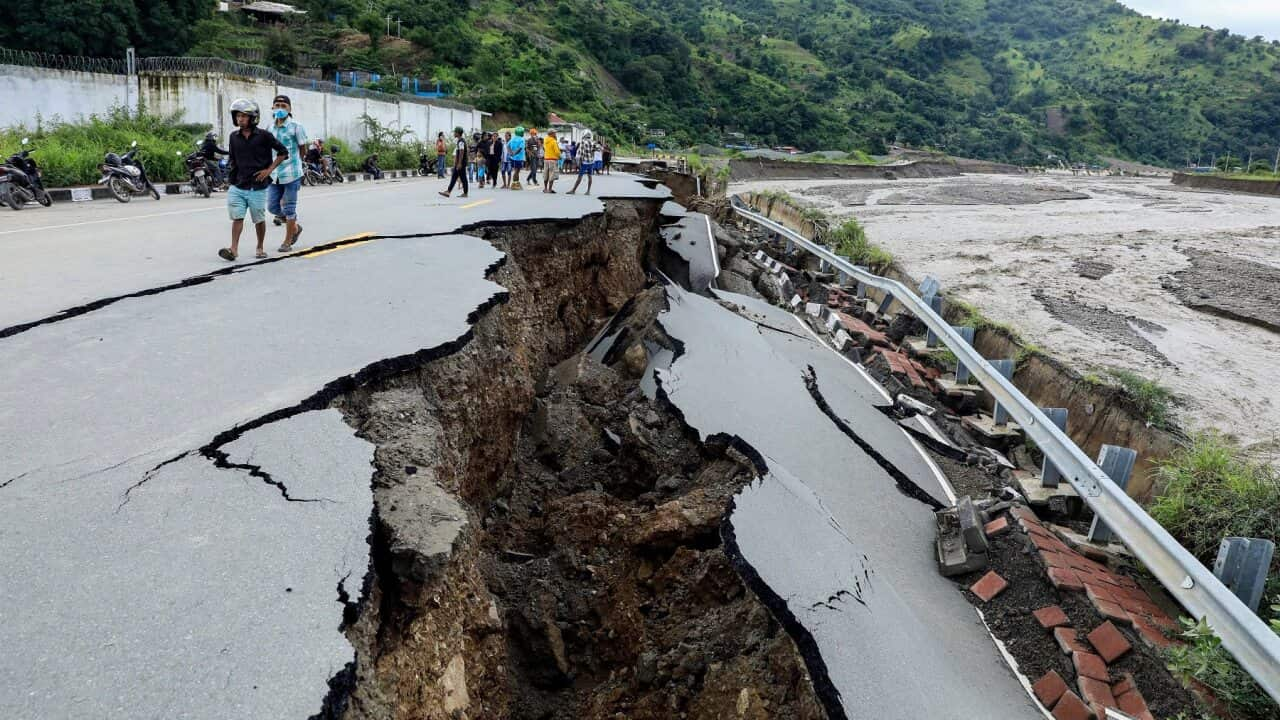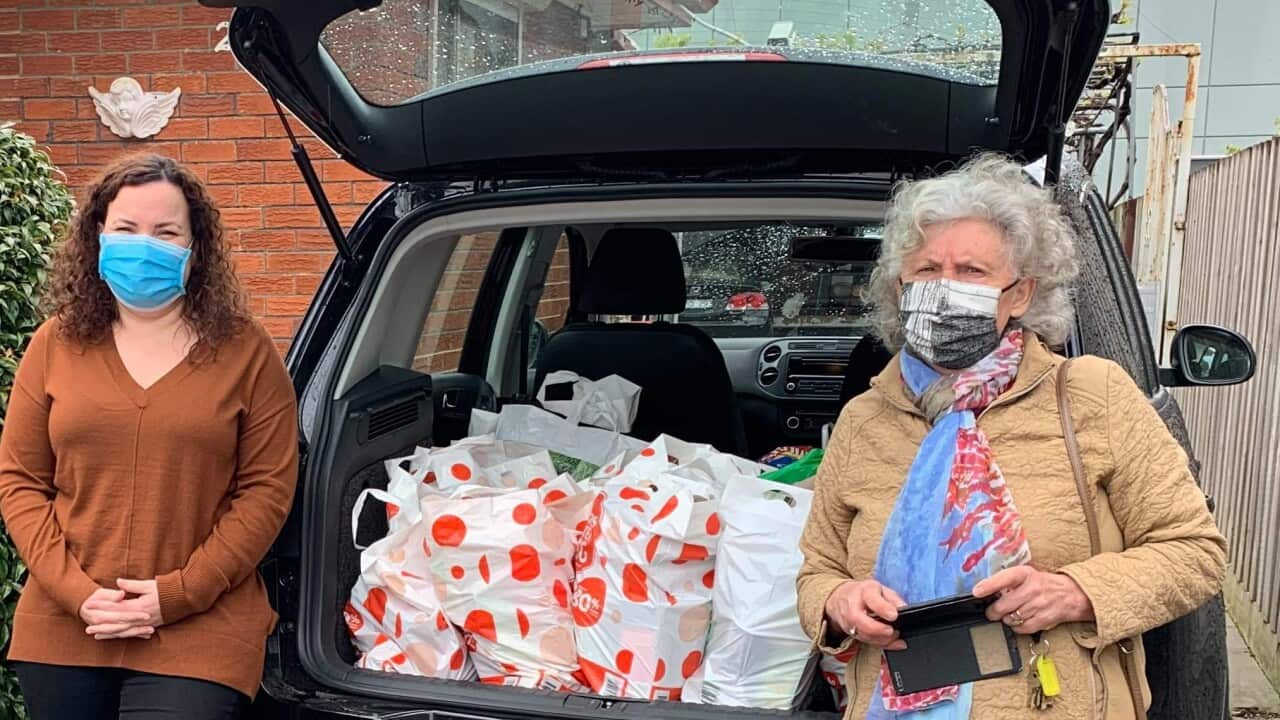Lisa Palmer is an academic, writer and filmmaker who teaches and researches at the University of Melbourne. She lives in Melbourne with her Timorese husband, Quintiliano Mok, and their children and regularly travels to Timor-Leste to carry out research and visit extended family.
She has published widely in academic journals and is the author of two books, Island Encounters: Timor-Leste from the outside in (ANU Press, 2021) and Water politics and spiritual ecology: Custom, environmental governance and development (Routledge, 2015). She has also made two films about the island of Timor: Wild Honey: Caring for bees in a divided land (Ronin Films, 2019) and Holding Tightly: Custom and Healing in Timor-Leste (Ronin Films, 2021). Why did you decide to write a book about your ‘encounter’ with Timor-Leste?
Why did you decide to write a book about your ‘encounter’ with Timor-Leste?

Lisa Palmer e a família na fronteira do Timor-Leste com a Indonésia em 2018. Source: Supplied/ Lisa Palmer
As an anthropologist and geographer, I am trained to pay attention, listen, observe and unpack the nuance and constant negotiations that make up people’s lives. As I have come to know about the richly interconnected worlds of Timorese cultural and ecological communities, I have learnt quite a bit about their life pathways. I have begun to see and, more importantly, feel the connections between people, their lands, waters, local histories, politics and customary practices. As I have investigated these connections as an academic, people often explicitly ask me to record and take their stories to those in power. I have come to realise that people do not share their stories without reason; they expect me to weave something new with the knots and threads of these stories. As the cloth takes shape, so too do my obligations to these people and all their varied aspirations.
So, I wrote my new book Island Encounters to reach a general rather than specifically academic audience. East Timor has a place in the hearts of many Australians and others connected to the country through its diaspora around the world. Those lucky enough to travel there return captivated by its people, their land and their resilient spirit. In Island Encounters I wanted to share my insights from two decades of experience with the country, shining a light on the richly woven tapestry of Timorese lives and landscapes. With an eye to the country’s complex history and politics, my aim was to write an accessible book for a wider readership, tracing paths redolent in longing and learning, belonging and bewilderment, courage and conviction to tell of an island divided by colonialism and conflict but also joy and ongoing connection. How do you define your book? Is it like a travelogue?
How do you define your book? Is it like a travelogue?

Rebanho de Búfalos na planície de Baucau. Source: Lisa Palmer
Island Encounters is part travelogue, part memoir and part accessible academic analysis. It is a narrative of Timor shaped by a journey from outside in. Incorporating my experiences from more than two decades of involvement with Timor-Leste and, more particularly, the months I spent travelling with my young family from west to east in 2018.
What did impress you the most about the Timorese?
What impresses me most about the Timorese I have encountered and built relationships with over many years is their quiet determination to maintain their relationships between their lands, waters, traditions and each other. This is characteristic shared broadly by most Timorese, whether they be urban or rural dwellers, although this is something we do not often hear about from the nation’s modernising capital and centre of power Dili. Which encounter impressed you the most?
Which encounter impressed you the most?

Laku inicia subida na floresta para capturar mel. Source: Lisa Palmer
My participation in a nocturnal wild honey harvest and community ritual with the Lookeu community living right on the East and West Timor border. This border, which now delineates Timor-Leste and Indonesia, is also a relic of Portuguese and Dutch colonization and their centuries long carving up of authority over the island. Created against the will and with the active resistance of the of the local Tetum speaking peoples, it is a border which continues to painfully divide families along with their ancestral lands and waters. The annual wild honey harvests in these borderlands are significant as a way of pushing back against this division and bringing together in celebration people, bees and stories from both sides of the border.
During these nocturnal honey harvest ceremonies men known as laku take on the persona of the Asian palm civet cat and climb tens of metres into the forest canopy with palm fiber firesticks in pursuit of wild honey, bee larvae and wax. All the while singing poetic love songs to the bees.
In May 2018 I was there with my family and my friend Balthasar Kehi to film this event with his Lookeu community. This was my first filmmaking experience and I while I had become increasingly worried about the technicalities of filming the harvest, especially at night, I had not factored in the swarms of bees which started attacking me as I filmed from the jungle floor. The sound, smell and power of these swarms was terrifying—not to mention the pain of the stings that still managed to get through my gloved hands.
But when the camera was not in use and the torches we were using for lighting were switched off, peace would return to the forest floor. We would be serenaded again by the red cinder blooms of the firesticks and the ritual love songs of the laku. The peace was punctuated by the occasional calls from old men on the ground, entreating the laku to secure a ‘date’ for next year with their beloved bees.
Alternatively, keen for the harvest to be filmed, these same senior men would periodically call out to admonish the other ground-dwellers to stop their banter. ‘Be quiet! We are SHOOTING,’ they would yell. All during their exchanges, a pulley system of buckets was being used to convey the honeycomb from the high branches to the ground, where a small team of men were waiting to collect it and, amid the swarming bees, carry it off to the forest altar.
Are you fluent in Tetum? How do you see a country where people speak Tetum, English and Portuguese?
I speak Tetum Dili, not the Tetum Terik of the border region. Tetum Dili is a lingua franca and has a lot of Portuguese, Indonesian and increasingly English loan words. To speak it fluently or to an ‘academic standard’ it helps to have a good grasp of Portuguese and Indonesian—neither of which I speak. I have largely learnt my Tetum with my Timorese family out in the rural areas where I spend most of my time. In these areas, most people’s first and even second language or third language is one of the 16 indigenous languages spoken across Timor-Leste. In my daily encounters with people in these contexts we are often all non-first language speakers of Tetum Dili.

Homem caminha por sua plantação de arroz em Timor. Source: Quintiliano Mok
The bilateral relationship between Timor and Australia is pitched as one of ‘good neighbours’, although this has not always been the case. As countless books haves shown us, during the long and bloody Indonesian occupation of East Timor, Australia turned a blind eye even encouraging the Indonesian invasion. While this posturing was tied up in the geopolitics of the day, so too was it tied up in Australia’s lust for the oil and gas reserves in the Timor Sea. This legacy continues to unsettle and impact the bilateral relationship in many ways.
My aim in this book is to tell another side of that relationship: one of the strong people to people ties that have bound and continue to bind people from across these two nations and to shine a light on lesser-known stories, encounters and relationships with Timor’s diverse peoples and landscapes. What are you doing at the moment, promoting the book, working on the next one?
What are you doing at the moment, promoting the book, working on the next one?

Lisa Palmer no complexo sagrado de Maubisi Mauloko, no Timor. Source: Russell Drysdale
Right now I am promoting my book (which is free to download from ANU Press) and awaiting feedback from readers! I am also excited to be launching a new film I have co-directed Holding Tightly: Custom and Healing in Timor-Leste (Ronin, 2021). While carrying on with my regular job carrying out research and teaching at the University of Melbourne, my family and me are eagerly waiting for the borders to re-open so we can head back for a visit our second home in Timor-Leste.
Find the link to download for free the book "Island Encounters: Timor-Leste from the outside in" by Lisa Palmer.













